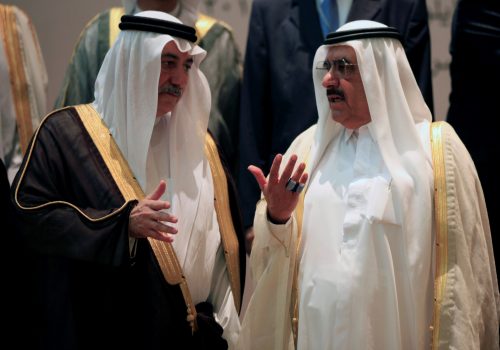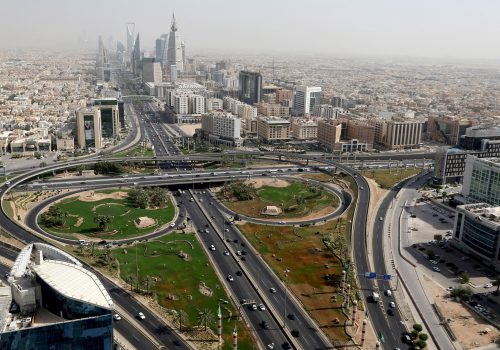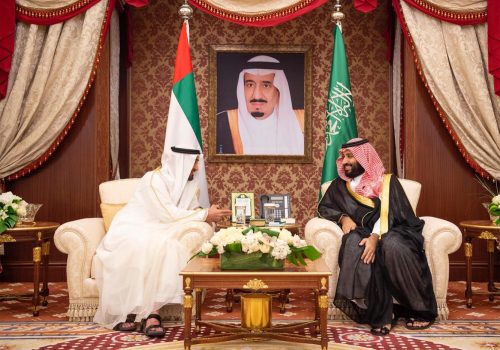October 25, 2021
Saudi Arabia’s economic transformation benefits the UAE too
While many commentators have been keen to interpret Saudi Arabia’s attempts to transform Riyadh into the Middle East’s economic capital as a threat to the economic interests of the United Arab Emirates (UAE), a more nuanced analysis suggests something akin to a rising tide that will lift all boats.
When Saudi Arabia announced plans in February requiring international companies to have their regional headquarters in the Kingdom as a precondition for participating in government contracts from 2023 onward, many interpreted the move as a shot across the bow at the UAE since Dubai is the location of choice for most companies operating in the region. A regional headquarters is what economists call an indivisible asset, which can’t be divided into smaller pieces—meaning that Riyadh’s gain must be Dubai’s loss. This has set the stage for the narrative of an economic war between Saudi Arabia and the UAE.
Beyond this, many of the activities that have made Dubai a magnet for the region’s talent— such as its art scene, restaurants, hospitality, luxury hotels, and shopping—have been targeted by Saudi Arabia’s economic policymakers as areas for development within the Kingdom. This has served to reinforce the view that the two countries are on an economic collision course.
However, a quick look at some of the other leading economies in the world suggests that this narrative might be flawed or overly simplistic. For example, while American cities New York and San Francisco compete fiercely in many domains, in general, the economy of each metropolis benefits from the success of the other because it creates business for their supposed rival. Within the European Union, Paris and Frankfurt—and previously London—have vied for decades to be known as Europe’s financial capital, yet the competition appears to have been constructive rather than destructive, as the growth of each creates demand for the services of the others.
Positive outcomes likely from economic competition
In the case of the Middle East’s two largest economies, there are several reasons to be optimistic about the effects of competition. Most revolve around the proposition that Saudi Arabia’s policies will make the region’s economic pie larger. In other words, a larger slice for the Kingdom need not imply a smaller slice for the UAE.
Unfortunately for the people of the Arab world, the region’s economy has been hamstrung by poor economic statecraft since World War II. For some countries, the leftist economic policies exported by the former Soviet Union have stifled economic growth for decades. Poor education, marginalization of women, political instability, and violent conflict have also played a role in the region’s economic stagnation.
However, there is considerable unrealized economic potential in the region. The liberalization-led growth of the Middle East’s largest economy—Saudi Arabia—can play an immensely positive role in raising living standards in the Kingdom’s neighbors through various channels.
The first is the direct trade route. As Saudis’ living standards rise, so will the opportunities to profitably trade with Riyadh, and the countries in the Kingdom’s immediate proximity are best placed to exploit the emerging opportunities. Whether it is Saudi tourists spending their income in the bazaars of Bahrain, fishing in the Arabian Sea off of Oman, or purchasing luxury perfumes produced in the UAE, there is ample space to grow existing consumer markets. The opportunities for mutual investment are tremendous, much like those accruing to the members of the Association of Southeast Asian Nations, the South American trade bloc Mercosur, and other regional economic blocs established.
The second route is the indirect impact on the quality of policymaking and governance across the entire region. Well-intentioned governments will benefit from Saudi Arabia’s evolving experience in creating a dynamic Middle Eastern economy, while the more intransigent ones will face greater pressure to modernize their economies to keep up. Even the UAE—which has been at the forefront of sound economic statecraft for the last twenty years—has room to improve, and exposure to Saudi Arabia’s aggressive experiment in economic reform will push Emirati policymakers to develop even better policies.
In addition to these primarily economic channels, there are also gains associated with security and defense, stemming from the classical liberal theory of international relations. Over two centuries ago, philosophers such as Thomas Paine, Immanuel Kant, and Montesquieu argued that trade and commerce help humans overcome the tendency to engage in violent conflict, both by making them feel more connected to one another and by amplifying the losses associated with engaging in commerce-interrupting wars.
Violent conflict has racked parts of the Middle East for centuries and the general insecurity borne from that is reflected in the billions that Saudi Arabia and the UAE spend on security and defense annually. There are massive economic gains to be reaped from the region’s de-escalation and resources being allocated away from arms and toward economic development. The European Union (EU) exemplifies these gains. For example, there was a decrease in defense spending by member states when Western Europe integrated during the latter half of the twentieth century and Eastern Europe joined the EU during the new millennium.
Finally, a more educated Saudi Arabia will benefit the UAE as both countries seek to become leading innovators. A diverse and multipolar intellectual environment is critical to creating a dynamic research center in Dubai or Riyadh, and the widely successful EU Erasmus researcher exchange program—which moves scholars and students across the EU’s member states via grants and other instruments, allowing researchers to exchange ideas—is a testament to this principle.
Why the pessimism about Saudi-UAE economic competition?
The dominance of the zero-sum narrative is not a random phenomenon and can be explained by several factors.
Firstly, the economies of Saudi Arabia and the UAE have historically been highly dependent on oil that is exported outside the Middle East, and extracting and exporting the oil depends almost entirely on technology developed extra-regionally. A zero-sum outlook is far more warranted through this specific lens of oil production and exports. Perhaps this analysis has unconsciously impacted those examining the new circumstances unfolding in 2021.
Secondly, while there is a dearth of competent, homegrown economists working in the Middle East, unfortunately, hyperbolic social media posts from less-informed partisans tend to dominate the discourse. This vacuum is also partially filled by Western scholars, whose perspective on the Gulf is easily swayed by the distorted internet-driven narrative, both because they are thousands of miles away from the region and because there are so few researchers of Gulf origin working in Western institutions.
Ultimately, a growing and vibrant Saudi economy will be of great benefit to the UAE’s. Competition will always create losers, but with the right policies, their losses can be transient and compensated for by larger gains experienced by winners. The key indicators to follow over the next decade are not the number of companies with headquarters in Riyadh or Dubai but rather the growth rate of their economies.
Omar Al-Ubaydli is a non-resident scholar at the Arab Gulf States Institute in Washington in the United States and president of the Bahrain Economists Society. Follow him on Twitter: @omareconomics.
Further reading
Mon, Sep 13, 2021
Defusing Saudi Arabia-UAE tensions through economic rebalancing
MENASource By
By identifying the economic imbalances contributing to the breakdown, recalibration is possible to rebuild a more balanced relationship that circumvents the zero-sum game that has given rise to the Riyadh-Abu Dhabi dispute.
Mon, Aug 23, 2021
COVID-19 lockdown highlights policies to reduce pollution in Saudi Arabia
MENASource By
In March 2020, the Saudi government instituted a national lockdown for three months to prevent the proliferation of the coronavirus. These extraordinary circumstances provide the perfect experiment for policymakers and researchers to investigate whether daily human activities significantly affect pollution levels in an oil-exporting country like Saudi Arabia.
Mon, Aug 2, 2021
Saudi Arabia and the UAE are economic frenemies. And that’s a good thing.
MENASource By Amjad Ahmad
Both Riyadh and Abu Dhabi have wisely made the economy the focal point of their strategies for the future, as evidenced by national policy changes and a reduction in foreign adventures. Ending the Qatar blockade, and opening a dialogue with adversarial neighbors like Iran and Turkey is linked to long-term economic ambitions.
Image: People attend the Global Al Summit in Riyadh, Saudi Arabia October 21, 2020. REUTERS/Ahmed Yosri


